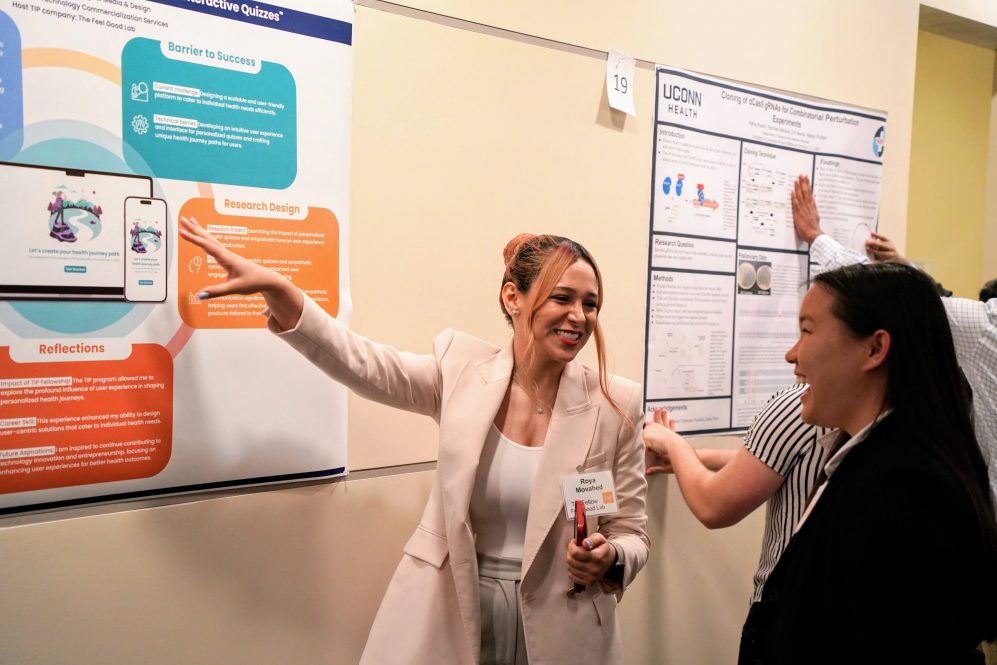There are certainly worse ways to spend a summer vacation than working with startup companies developing early-detection cancer screens, bacteria-killing clothing, and drones that can fly in the pouring rain – or studying foundational science in a neurobiology, immunology, or bioinformatics academic lab.
The TIP Innovation Fellowship and Health Research Program, both 10-week immersions in the world of research and entrepreneurship, have been connecting UConn students to these experiences for 11 and seven years, respectively. The combined cohort of students from both programs presents their research at the annual Summer Research Day showcase. This year, according to Caroline McGuire, the cohort included a record-breaking 70 students.

McGuire, executive director of Enrichment Programs and director of the Office of Undergraduate Research (OUR), founded and oversees the Health Research Program, while Caroline Dealy, the founder and director of the TIP Innovation Fellowship, manages that side of the house. (Yes, they do call themselves “the team of Carolines.”) They both coordinate the event to make sure Summer Research Day goes off without a hitch, despite the huge number of moving pieces and some high-profile attendees – this year including state legislators Keith Denning, Joan Hartley, MD Rahman, and Kerry Wood.
UConn leadership guests included Amy Gorin, interim vice provost for health siences; Fumiko Hoeft, director of the UConn Waterbury campus, who also runs the Brain Imaging Research Center; Kimberly Dodge-Kafka, assistant dean for research planning and coordination and director of the MD/PhD program at UConn Heath School of Medicine; Raj Lalla, associate dean for research at the School of Dental Medicine; Leila Daneshmandi, School of Engineering innovation professor and director of the Engineering Entrepreneurship Hub; and Paul Parker, director of UConn’s TIP Technology Incubators.

The day’s itinerary included two slates of presentations from student speakers, interspersed with interactive poster sessions. The morning speakers included students who had worked with the companies Bastion Health, Enable Life Sciences, and QCDx – all health startups housed at the UConn Farmington Technology Incubation Program, or “TIP.”
The companies all boast a signature technology with the aim of disrupting existing care for complex conditions. Bastion offers an at-home screening kit for prostate cancer; Enable Life Sciences produces a cell culture medium that stimulates the growth of cancer-killing cells; and QCDx offers a minimally invasive “liquid biopsy” for early breast cancer diagnosis.
A Discipline-Spanning Student Team
For the student team who worked with QCDx, their TIP Fellowship showcased the academic and disciplinary diversity needed to operate a modern, technology-assisted healthcare company.
Jade Siquiera, a rising junior studying allied health sciences at UConn Storrs, shared her experiences working with QCDx, where she analyzed liquid biopsy images for the presence of circulating tumor cells.
“As a first-generation student, this is a chance to explore more than what it takes to earn a bachelor’s degree,” Siquiera said. “And as a future healthcare professional, I want to keep my curiosity open to cancer diagnostics research, and also to advocate for these cancer screenings and to promote health equity for all.”
Lauren Ampadu, a fourth-year PharmD student at the UConn School of Pharmacy, shared case studies of two breast cancer patients enrolled in a clinical trial at UConn Health who were pronounced cancer-free after QCDx diagnostics helped determine the best course of treatment. She credits her TIP Fellowship experience with sharpening her academic focus and identifying a potential career pathway.
“I got to hone my skills with an outstanding team that spans multiple disciplines, practicing by the book, when necessary, but emphasizing innovation and courageously grasping opportunity,” Ampadu said. “My mission is to become a skilled clinical pharmacist and a philanthropist doing my best to diminish the power of disease and help patients to regain control of their well-being.”
Angelica Tafas, a rising sophomore in the department of women’s, gender, and sexuality studies at UConn Storrs, got to flex her social media and web skills assisting with QCDx’s online presence, while A.J. Butler and Aidan Parilla, both computer science undergraduates, helped with software development.
Today’s Talent, Tomorrow’s Technologies
Modern solutions for modern problems was the theme of the second half of the day.
Leslie Caromile, an assistant professor of cell biology at UConn Health, delivered a keynote address entitled “The Importance of Including Diverse Populations in Biomedical Research.” Caromile researches prostate cancer and directs an undergraduate summer program that encourages and supports students to enter biomedical research careers. As a cell biologist, Caromile spoke to the importance of clinical study diversity not only from an ethical standpoint, but also when considering clinical efficacy.
The afternoon featured more posters from HRP fellows – spanning bioengineering, cancer research, and genetics – and presentations from TIP Fellows who worked with the technology startups Arome Science, Nanoionix, and WaveAerospace.

Kristina DeMichiel, a marketing and psychology major at UConn Storrs, shared her journey meeting with representatives from major retail and supply partners ranging from Bass Pro Shops to the U.S. Army as she conducted market research for Nanoionix’s proprietary self-disinfecting materials.
Daniel Barreto, an economics major at UConn Stamford, and Andrew Lefers, an engineering robotics major at UConn Storrs, demonstrated an LED-cartridge-dropping prototype they’d developed for Wave Aerospace’s drones.
Summer Research Day wrapped with some encouraging words from Leila Daneshmandi, who founded a health startup, Encapsulate, while pursuing graduate studies at UConn.
“It’s been fascinating to look at the work you’ve done, and I hope you’re as proud of yourselves as the people in this room,” Daneshmandi said.



